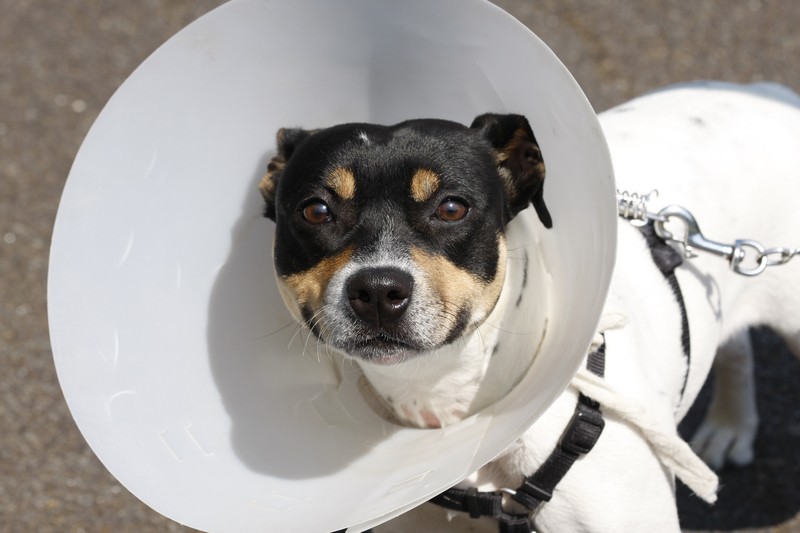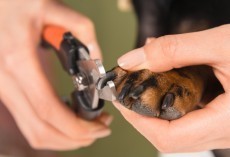Actually, your dog becomes much healthier and far more manageable once they are fixed. Seriously, there are well-known medical and behavioral benefits in having your male dog neutered. And yes, there is the issue of pet overpopulation which results in millions of healthy dogs and cats being euthanized (humanely put to death) each year in the United States. Stopping a problem prior to it occurring is simple logic.
While the traditional age for male neutering is six to nine months, puppies as young as eight weeks old can actually be neutered as long as they’re healthy. Adult dogs can be neutered as well, although there’s a slightly higher risk of post-operative complications in older dogs who are obese.
According to the ASPCA there are many benefits:
Medical Benefits
There are significant medical benefits to be gained from neutering your dog. Neutering prevents the following medical conditions:
- Testicular cancer. Neutering removes the testes and eliminates the risk of your dog developing testicular cancer, a common and life-threatening cancer in older male dogs.
- Prostate problems.Without neutering, your dog’s prostate will gradually enlarge as he gets older. This can become uncomfortable for him and even make urination difficult. If the prostate becomes infected, it’s difficult to treat without neutering. While neutering doesn’t completely guard against prostate cancer, it does prevent enlargement and possible infection of the prostate.
Behavioral Changes
The only behaviors influenced by neutering are related to male sex hormones. Neutering won’t affect your dog’s working abilities, friendliness, playfulness or personality. However, hormones like testosterone are reduced by neutering, which can reduce behaviors associated with them. You may see a reduction in the following behaviors after neutering your dog:
-
Urine marking.Testosterone makes a dog more interested in advertising his presence by urine marking. Neutering your dog will reduce his desire to excessively mark his surroundings with urine. This includes areas outside and around your yard, as well as inside your home.
-
Unaltered dogs often try to leave home in search of females in heat, which puts them at risk of getting lost and being injured or killed on roadways. Neutered dogs tend to live longer than sexually intact dogs, probably because they’re less likely to engage in risky behaviors like roaming. Neutering will lessen or eliminate your dog’s urge to roam.
-
Some studies suggest that neutering can decrease aggression toward other male dogs because testosterone might increase the likelihood of aggressive behavior. Other studies have found no significant relationship between aggression and neutering. However, there are many complex reasons why dogs fight, and you may not see any changes in your dog’s aggressive behavior simply because he’s been neutered.
-
Social problems. Other male dogs can easily detect an unneutered dog’s high testosterone level and become aggressive. This can make your intact dog a target of harassment by other male dogs. Neutering can reduce or eliminate this undesirable attention.
-
Inappropriate mounting.Your dog might be less likely to mount other dogs, people and inanimate objects after he’s neutered. However, mounting is a complex behavior. It can be a sexual behavior, but it can also be a playful behavior or an attempt to assert social control. Only sexually motivated mounting can be reduced by neutering.
So, after reading this long list of benefits, it may be time to put pride aside and get your dog taken care of. Keep in mind, to avoid the advance of the conduct listed above, it is best to neuter your dog prior to sexual maturity at six to nine months of age. That way, he’s unlikely to develop those unwanted habits. If your dog has practiced these habits for months or years, the activities might still persist after neutering. If you have an older dog, it’s still a good idea to have him neutered. Even if you can’t completely get rid of all his problematic behaviors, you might see them less often after he’s neutered—and neutering will still be beneficial to his overall and long term physical health.
If your dog still retains those bad habits that you dislike after you neuter him, like excessive urine marking, wandering, belligerence or mounting, it’s best to seek professional advice and even pursue training work. Getting help is particularly important if your dog has an aggression problem.
It’s important to realize that the potential drawbacks of neutering are minimal when compared to the benefits. However, you should discuss both the pros and cons with your veterinarian to make the best decision for the health and well-being of your dog. And keep in mind that more and more communities have enacted laws that actually require pet owners to neuter their dog in order to obtain a pet license.
If you want to read more about the pros and cons of neutering your pooch, you can read the entire article by the ASPCA.
And yes men, you and your dog can still be proud and macho even after a few snips here and there.









